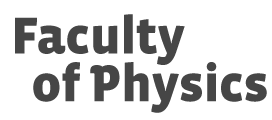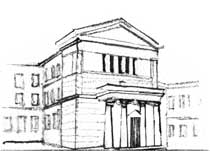Leopold Infeld Colloquium
2006/2007 | 2007/2008 | 2008/2009 | 2009/2010 | 2010/2011 | 2011/2012 | 2012/2013 | 2013/2014 | 2014/2015 | 2015/2016 | 2016/2017 | 2017/2018
2010-05-27 (Thursday)
konwersatorium nie odbędzie się
2010-05-20 (Thursday)
Prof. Abhay Ashtekar (Institute for Gravitation and the Cosmos, Penn State)
The Big Bang and the Quantum
General relativity ushered-in the era of modern cosmology. The resultingFriedmann models ---and perturbations thereof--- have enjoyed anastonishing degree of observational success. But general relativity isincomplete because it ignores the quantum nature of gravity. It predictsthat space-time comes to an end and physics stops at singularities. Recentdevelopments in non-perturbative quantum gravity have shown that thesepredictions cannot be trusted. Specifically, quantum geometry effects canresolve singularities, thereby opening new vistas. My talk will coverthese foundational issues and discuss implications of the new Planck scalephysics near the Big Bang.
2010-05-13 (Thursday)
Dr Zbigniew Idziaszek (IFT UW)
Ultracold gases of polar molecules
Ultracold polar molecules open new prospects for quantum gases withlong-range and anisotropic interactions and can find applications inquantum information science and in precision measurement. Recentexperiments reported production of relatively dense gases or lattices ofultracold molecules in their rotational and vibrational ground state. Itis essential to understand elastic, inelastic and reactive collisions ofsuch molecules in order to control and utilize them effectively. In thistalk I will briefly review recent advances in this field, and I willpresent a method based on the concept of a quantum defect to modelcollisions of ultracold molecules. In the case of highly reactivemolecules this method predicts universal reaction rates that can becalculated analytically from a knowledge of the long-range part of theinteraction potential.







